Workforce progress report 2017
Foreword
Welcome to our fourth annual SRA staff diversity report. Our report provides information on our workforce and the initiatives we have taken in 2017 as we work to ensure we have a diverse and inclusive workforce and workplace.
Diversity matters to us as individuals and as an organisation, from both an internal and external perspective. A diverse and inclusive legal profession is important and benefits wider society and the users and the providers of legal services. And for us, we know, and as our own February 2018 'The Business Case for Diversity' report said ' a more diverse business is a successful business'.
2017 saw us work to support the retention of a diverse workforce, notably through our growing number of networks, by listening to feedback from our staff via our staff survey and through the introduction and refreshing of policies and initiatives that embed the importance of equality, diversity and inclusion.
We have also done more to widen and deepen our recruitment approach, reaching out to different groups of people and providing resources to support applicants through the process. We are building equality diversity and inclusion into every aspect of our work and that matters nowhere more than for our people.
We know we have more to do and we are ambitious for the future. I am looking forward to building on the good foundations we have laid to develop an increasingly diverse culture and organisation.
Paul Philip
Chief Executive
Our equality, diversity and inclusion work
In 2010 section 149 of the Equality Act sets out Public Sector Equality Duties. We must comply with the duties and have due regard for the need to:
- eliminate unlawful discrimination, harassment, victimisation and other conduct prohibited by the Act
- advance equality of opportunity between people of different groups or 'protected characteristics'. Protected characteristics are defined as follows:
- age
- gender
- ethnicity
- disability
- religion or belief
- sexual orientation.
- foster good relations between people from different groups.
The broad purpose of the equality duty is to integrate consideration of equality and good relations in to day-to-day business. The mainstreaming of equality, diversity and inclusion (EDI) throughout our work is a priority for us. This report provides information on some of our work to do that.
The general equality duty requires organisations to consider how they could positively contribute to the advancement of equality and good relations. It requires equality considerations to be reflected into the design of policies and the delivery of services, including internal policies, and for these to be kept under review. Within this report we reflection the progress we are making.
Our EDI strategy 2014-17 included a workforce equality objective:
Develop a more diverse workforce and promote an inclusive culture, equality of opportunity for all staff and the behaviours and capabilities required to regulate proportionately, fairly and free from bias.
This is linked to our values:
- Independent
- Professional
- Fair
- Progressive
- Inclusive.
which all are embedded within our employee lifecycle.
To help to describe our work to develop a fully inclusive culture and a diverse workforce, this report is structured in three sections. It builds on our report from 2016.
As an organisation we expect the law firms we regulate to create and champion an equal and diverse culture, so we need to make sure we do the same. We expect our staff to consider equality, diversity and inclusion throughout their work, whatever their role.
Our workforce is broadly representative of the labour markets in which our offices are based - Birmingham and London. There has been little change in diversity profile of our staff over the last few years and there are several areas where we would like to improve in.
All data is as taken at 31 December 2017. Please note larger percentages have been moved to the nearest whole number whilst smaller percentages may show more detail.
In some cases, the data in this report will be presented in line with the staffing structure to express key points.
Our staff grading is structured in the following way:
- A–D: non-management roles
- E–I: specialist and management roles
- J–L: head of business units and directors. Leadership and senior management roles are included at this level.
Supporting a diverse workforce
From the beginning: attraction and recruitment
It is important to us that we share our EDI vision with staff from the start of their SRA journey, right from the beginning of the employee lifecycle at the recruitment stage. We encourage applicants to be individuals who are proud of their diversity, promoting equality of opportunity. We have delivered refresher recruitment training to hiring managers with EDI as part of each key topic, such as unconscious bias.
Throughout 2017 we worked with a number of partners to widen our attraction strategy to reach a diverse pool of applicants. This included building relationships with diversity-related job boards, for example Job Centre Plus, Vercida, mygwork and Proud employers. We also changed the branding on all recruitment advertisements at the relevant time to support and promote Pride events and we have trained our recruitment team to avoid the use of gendered language in recruitment adverts.
Our recruitment team has attended jobs fairs, run by Disability Confident, specifically focussed on employing people with a disability. And we have secured reaccreditation as a Disability Confident Employer for another two years (previously known as Two Ticks).
We have also worked with industry experts to share best practice and help with benchmarking data.
As part of increasing social mobility and our commitment to reaching the widest possible pool of people, we trialled a new way of working. Candidates who are invited to interview are given access to an e-learning platform, designed to help people show their full potential at interview. The platform has been built by diversity and HR experts who recognise that tools to develop interview skills and confidence may help level the playing field.
This aims to help to 'level the playing field' by providing support and guidance to applicants from all backgrounds at interview stage. The package includes a range of topic areas such as raising the need for reasonable adjustments with a potential employer.
And finally, we continue to measure the recruitment process – at each stage by grade and by characteristic. We are also looking to introduce questions on social mobility to align with best practice. We worked with the Cabinet Office to test prototype socioeconomic measures with our staff, who were very supportive, and are hoping to adopt the now published final measures.
Continuing the journey through learning and development
Once in post, we support our staff to make our commitment to EDI a reality. For example, we have responded appropriately to queries and requests such as part time working (where a full-time vacancy has been advertised), reasonable adjustments and other disclosures.
At the end of 2017, 14 members of staff volunteered to become Mental Health First Aiders. We wanted to promote good wellbeing at work and to recognise that not all disabilities are visible. Following a two-day training course, they now provide valuable help and support, as well as signposting to more specialist resource.
All new starters are invited to an induction event held over two days. They are introduced to our values and behaviours, our ways of working and to the network groups within our organisation. As part of our standard induction process, all new staff are required to complete a Diversity and Inclusion e-learning module. This is followed by a Values, Motivation and Behaviours workshop, which provides a better understanding about appreciating difference.
All new managers are required to complete a manager's version of the Diversity and Inclusion training which includes videos and scenarios to bring the topic to life. This module is repeated every two years.
In September 2017, we launched a series of resources to guide and support managers in managing their staff. Included within the resources is clear guidance on our legal obligations and specific examples that highlight EDI.
We use a Strengths Deployment Inventory (SDI) tool which identifies individual motivational preferences and reactions in conflict. The tool has been in use for two years and delivered as an SDI session to new starters and teams. This has now been embedded into a training module-based around Dignity at Work and Unconscious Bias. The aim of the session is to utilise the SDI findings to create a more inclusive environment, including how our personal motivations can influence our view of the world and how best to expand that view.
All staff are able to (and encouraged to) pursue their personal development and can obtain funding through the professional development policy for external courses or qualifications against key criteria.
And importantly, when designing training and content, we ensure that the products and content are accessible to all.
SRA Allies
In May 2017 we introduced SRA Allies as an opportunity for all our staff to show support to LGBTQ+ colleagues as part of their commitment to creating a diverse and inclusive workplace. As an SRA Ally staff can demonstrate their support by getting involved in key events and initiatives. They do not need to be a member of a network, nor do they need to identify as LGBTQ+.
Through SRA Allies we want to:
- raise awareness of the issues that LGBTQ+ colleagues may face
- encourage people to be advocates and supporters of our LGBTQ+ colleagues.
We know that if someone is an Ally, they are likely to be someone who will challenge against homophobic, biphobic or transphobic jokes in the organisation. Someone who will try to understand the issues and support LGBTQ+ colleague by making the workplace a space where we can all be ourselves.
We invited everybody who would like to be an SRA Ally to make a pledge of support in line with the Allies aims.
In October 2017 we broadened the Allies programme and ethos to support all our networks and communities, making sure that behaviour that is not inclusive is addressed.
Staff Engagement Survey
In November 2017 we ran a full staff engagement survey. The results showed us that our staff felt much more positive than they did the preceding year about gaining a sense of value through their work and that they were proud to work for the organisation. The results also showed an increase in staff saying they would recommend the organisation as a place to work.
As before, we included bullying and discrimination questions in this survey. The number of staff who said they have experienced bullying remained low but did increase marginally, although the actual number of incidents declined by two. This will continue to be a priority for us. It is positive to see that staff feel able to speak up about their experience and this is something that we focused on when creating a staff survey action plan for 2018.
Stonewall Equality Workplace Index
We are proud of our journey with Stonewall and that we have increased our ranking on the Stonewall Workplace Equality Index by 70 places to 171. Based on Stonewall's suggestion and feedback, we have changed the way we work and introduced new ways of working to make us more supportive of the LGBTQ+ community.
Our networks
In previous reports we have shared details of networks established by our staff, which include:
- Black, Asian, Minority Ethnic (BAME)
- Christian
- Disability (Accessibility)
- LGBTQ+ (Nexus)
- Women
Alongside these, in the past year we have seen the creation of a new network focusing on providing support and information for carers, iCare.
This supports staff caring for a family member, friend or neighbour, recognising how rewarding caring can be but also that it is sometimes difficult. As a network iCare aims to allow staff to share experiences but is also somewhere to get practical information about social care and health matters such as powers of attorney, Deprivation of Liberty Standards assessments or funding for social care.
In 2017 we started cross-network meetings to create an opportunity for the forums to meet, collaborate, foster good relations between different groups and for sharing best practice and ideas. The networks have worked together to create a calendar that celebrates events and raises awareness of diversity throughout the year. For example, Access Ability worked with Nexus again in 2017 to support World Aids Day.
The networks have also shared ideas to help grow, manage and publicise their networks in the best way and to embed EDI in everything we do.
As part of this, the networks wanted to establish links with the wider community and we are now members of the Business Disability Forum, the Midlands Ability Networking Group and attended a Sight Loss at Work presentation given by RNIB.
Engagement
Events our networks have been run or been involved with include:
- our presence at Pride parades
- supporting Mental Health Awareness Week and the This is Me campaign
- holding a screening of Stephen Fry's "out there" documentary
- attending a Stonewall conference
- Eid, Diwali, Christmas and Vaisakhi celebrations
- career journey speed network event sharing tips, guidance and their experience
Focus on our Women's network
In 2017, the Women's network held events focussing on development and awareness raising. Topics covered included Power Posing, Imposter Syndrome, transgender issues and our thematic project about progression in the law for women and BAME individuals.
The network also:
- surveyed members on attitudes to mixed gender toilets and fed the results back to the staff forum
- contributed intranet articles to support National Work Life Balance week
- supported our Women in Law event, in partnership with the Association of Women Solicitors.
The group also have new terms of reference and a new action plan, which culminated in a successful series of events in readiness for International Women's Day in March 2018.
Plans for 2018 include:
- a focus on progression
- tie-in events linked to International Men's Day in November.
- a new name to better reflect the group's focus and membership as it now has its first male network member.
Reward
We provide a range of staff benefits which reflect our inclusive approach. Our EDI commitment extends to the partnerships that we have with others. We partner with a number of organisations that provide staff benefits, such as gym membership, childcare vouchers and health screening, and it is important to us when entering or renewing a contract that our partners share our values.
We continue to reward staff for embodying our values and encourage them to nominate each other for end of year awards and through simple 'thank you' cards. This provides an opportunity to recognise and celebrate staff who are demonstrating one or more of our five values in an exemplary way and making EDI part of their day to day work.
In addition to this, we run a Thank You scheme where staff can nominate colleagues for a small financial award when they deliver something really outstanding. To make sure the scheme is fair, we monitor and report on it. We can see that it is operating well and engaging staff across the organisation and at all grades.
Our performance management and development review process links to pay progression and bonus arrangements. Objectives agreed with staff align to our values and inclusive behaviours, as well as business-focused targets. On an annual basis, our senior management team reviews the outcomes as measured by diversity and across the staff profile to make sure the system is operating fairly.
Aligning our, policies, procedures, projects and initiatives
We have made improvements to our policies, or introduced new ones, to make the SRA a more inclusive place to work. These include:
- Dignity at Work
- Diversity and Inclusion
- Transgender – Transitioning at Work
- Shared Parental Leave
- Reasonable Adjustments
When introducing or revisiting policies we actively engage with our staff networks and forums to involve them and their experiences. For example, the Accessibility network reviewed the Reasonable Adjustment policy and process. In addition, we raise awareness of policies through specific calendar events eg Transgender Awareness Week.
Our staff profile
Gender
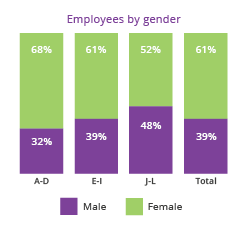
Key highlights and trends:
- The gender distribution across pay grades remained unchanged from 2016 to 2017. We have more women than men in every single pay grade with more women than men working at lower grades.
- In 2017 out of 85 new starters 56 (66 percent) were female - up from 60 percent in 2016.
- When looking at staff who were promoted in the last year 68 percent (40) were female. This is an increase on both 2015 and 2016 when 56 percent of all promotions were secured by women.
- Figures from 2017 highlighted a higher proportion of women (60 percent) than men engaging in training* opportunities.
- More women requested flexible working in 2017 – 63 requests were received in 2017 compared to 46 in 2016. Ten men made flexible working requests in 2017. This compares to nine requests made by men in 2016.
*non-mandatory training. Mandatory training includes topics such GDPR and health and safety.
Gender Pay Gap
In November we published the Gender Pay Gap figures for the overall Law Society Group, which we are part of. The figures compare positively with the national gender pay gap, which is 18.4 percent (ONS 2017).
| Mean | Median | |
|---|---|---|
| Law Society Group | 11.1 percent | 5.6 percent |
We also published the profile for the SRA in our 2016/17 Annual Review.
| Mean | Median | |
|---|---|---|
| SRA | 9 percent | 3.6 percent |
The figures reflect the female/male profile across the organisation, and the presence of more men in the senior management teams. This also means that there is a bonus differential at a higher level. In addition, a higher proportion of females work part-time in lower level roles.
We are committed to reducing the gender pay gap and have an action plan which includes reviewing: how we reward and recognise staff, our recruitment process, our policies and how we promote flexible working. We actively question shortlists that do not include women.
In 2018 we will report on gender pay. We anticipate that as part of initiatives in this area we will seek to make flexible working more accessible to men and build on the increase of requests made and granted to men in 2017.
Age
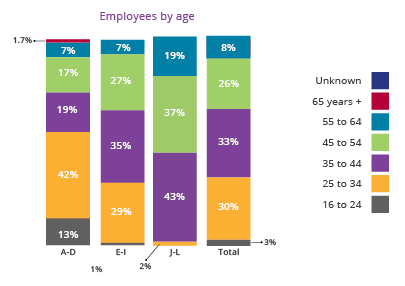
Key highlights and trends:
- Our age profile remains relatively unchanged from 2016 to 2017.
- At grades J-L, 37 percent of staff are between 45-54 years.
- When looking at both internal and external applicants those aged 25-34 years made up the highest percentage (47 percent) of successful applicants in 2017.
- 15 percent (nine staff) of those promoted were in the 16-24 bracket.
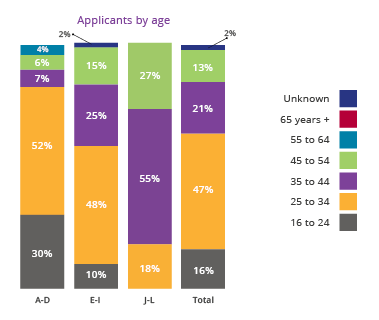
Ethnicity
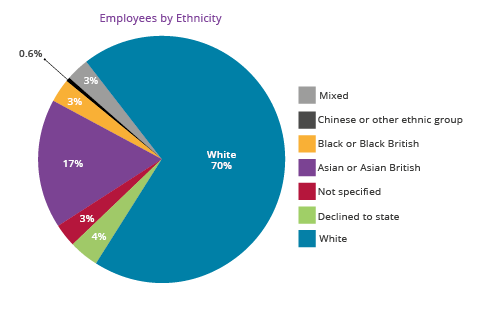
Key highlights and trends:
- 38 percent of our new starters were Black Asian and Minority Ethnic (BAME). The term BAME includes any member of staff who self-identifies their ethnicity as other than White British.
- 51 percent of external applications were from BAME applicants. 42 percent of these were successful to offer stage.
- 35 percent of BAME candidates were successful, which is the same as in 2016.
- The percentage of new starters that reported themselves to be Black or Black British has risen from six percent in 2016 to nine percent in 2017.
- 13 percent of all new starters in grades E-I were Black or Black British - up from six percent last year.
- The percentage of successful BAME applicants to role E-I was 29 percent in 2017, compared to 31 percent last year.
- 5 percent increase in those externally appointed to A-D roles that gave their ethnicity as mixed - from four percent in 2016 to nine percent last year.
- We have more BAME staff working in the lower grade roles than in more senior positions - 36 percent at grade A-D, 23 percent at grade E-I and four percent at grade J-L.
- Of those promoted in 2017 26 percent were BAME.
- There has been a decrease in BAME staff leaving E-I roles at the SRA in 2017 - 25 percent in 2016 compared to 23 percent last year.
- When taking all roles into consideration, there has also been a decrease in BAME leavers from 29 percent in 2016 to 26 percent in 2017. It is positive that we are retaining BAME staff and will continue to create a culture to support this.
Disability
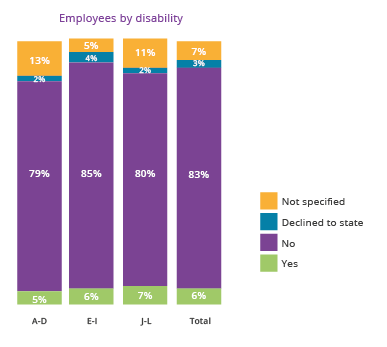
Key highlights and trends:
- Six percent of our staff shared with us that they had a disability in 2017 – up from five percent the year before.
- Previously four percent of our staff declined to tell us whether or not they had a disability. This is already down by 10 percent from 2015 and now there has been a further percentage reduction to three percent. This suggests that staff are feeling more able to share this information with us.
- 92 percent of new starters in 2017 said that they did not have a disability, two percent felt comfortable to share a disability with us and six percent did not specify. It is encouraging that new starters felt able to share this sensitive information with us and we hope to build on these results in future years.
Religion and belief
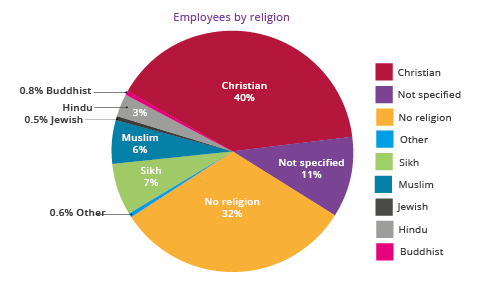
- In 2017, seven percent of those that had declared a disability were promoted.
- In 2017 there has been a small increase in the representation of some non-Christian religious groups, with the number of Sikh, Muslim and Hindu staff all increasing by one percent.
- New starters that were Muslim rose from 10 percent in 2016 to 11 percent in 2017.
- External applications from Muslim candidates reached 17 percent last year, with 21 percent of those applying for grades E or above.
- Of those that engaged in training* activities, 10 percent were Sikh.
*non-mandatory training. Mandatory training includes topics such GDPR and health and safety.
Sexual orientation
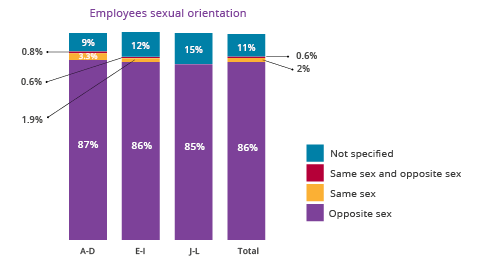
- Five percent of people who declared that they were gay or bisexual were promoted in 2017.
- We aim to increase the number of LGBTQ+ staff over the next three years. To help with this we will make our job application process more trans inclusive to encourage applications.
- 11 percent of staff chose not to specify their sexual orientation in 2017. This was 16 percent in 2016 and we hope reflects our work to promote our inclusive culture to encourage more staff to feel able to be open and to state their sexual orientation.
- There is a representation of LGBTQ+ staff across grade brackets A-I.
- Since we started our EDI journey in 2014 we have collected data on transgender staff. We are unable to report on this data due to the low numbers of staff within this category.
Our next steps
We have seen good progress in our ongoing EDI journey during 2017. Our commitment to improvement continues and next year will see us focus on mainstreaming EDI. Here are some of the activities that we are considering for 2018.
Sourcing, including broadening the diversity profile of the more senior members of staff
- Continue to review our attraction and recruitment strategies so we can attract a diverse pool of applicants and maximise the likelihood of each protected characteristic being proportionately represented across all grades. This may include utilising additional job advertising channels.
- Look at the profile of interview panels and encourage a mixed panel approach; making sure that unconscious bias is included in all training to support this.
- Stop asking applicants to provide their current salary to avoid inheriting assumptions or gender pay gap issues.
- Endeavour to increase the percentage of staff with a disability, who are LGBTQ+ and the number of BAME staff in leadership positions over the next three years.
Learning and development
- Make sure that training on EDI is threaded through all staff courses and events. This will include sharing best practice and learning from external speakers.
Continue to mainstream through our work
- Monitor and review our progress against our 2017 staff survey and action plans, including those areas that address issues arising in relation to EDI.
- Work closely with Stonewall on developing our application for the top 100 organisations in the annual Workplace Equality Index.
- Undertake promotional work internally to support a future staff diversity data collection so we can maximise response rates and improve the data's accuracy.
- Continue to analyse our diversity profile and identify areas of concern or positive changes.
- Explore how we could potentially link the EDI work that we are doing to our corporate social responsibility work which currently focuses on our social, economic and environmental impact.
- Monitor and review our policies and practices to make sure they are not discriminatory and are in line with EDI best practice.
Networks
- Continue to promote our staff networks so we can further embed and strengthen their position within the organisation. In turn, this should have a positive impact on attraction and retention of those with a protected characteristic.
- Increase visibility of the senior management team and wider leadership team in actively endorsing and promoting each of our staff networks.
Reward
- 2018 will see the second data report on our Gender Pay Gap. We hope to see the impact of our work in the results, but we are realistic and we know that change takes time.
- As part of our staff survey action plan, we will review bonuses and consider any changes with EDI in mind.
